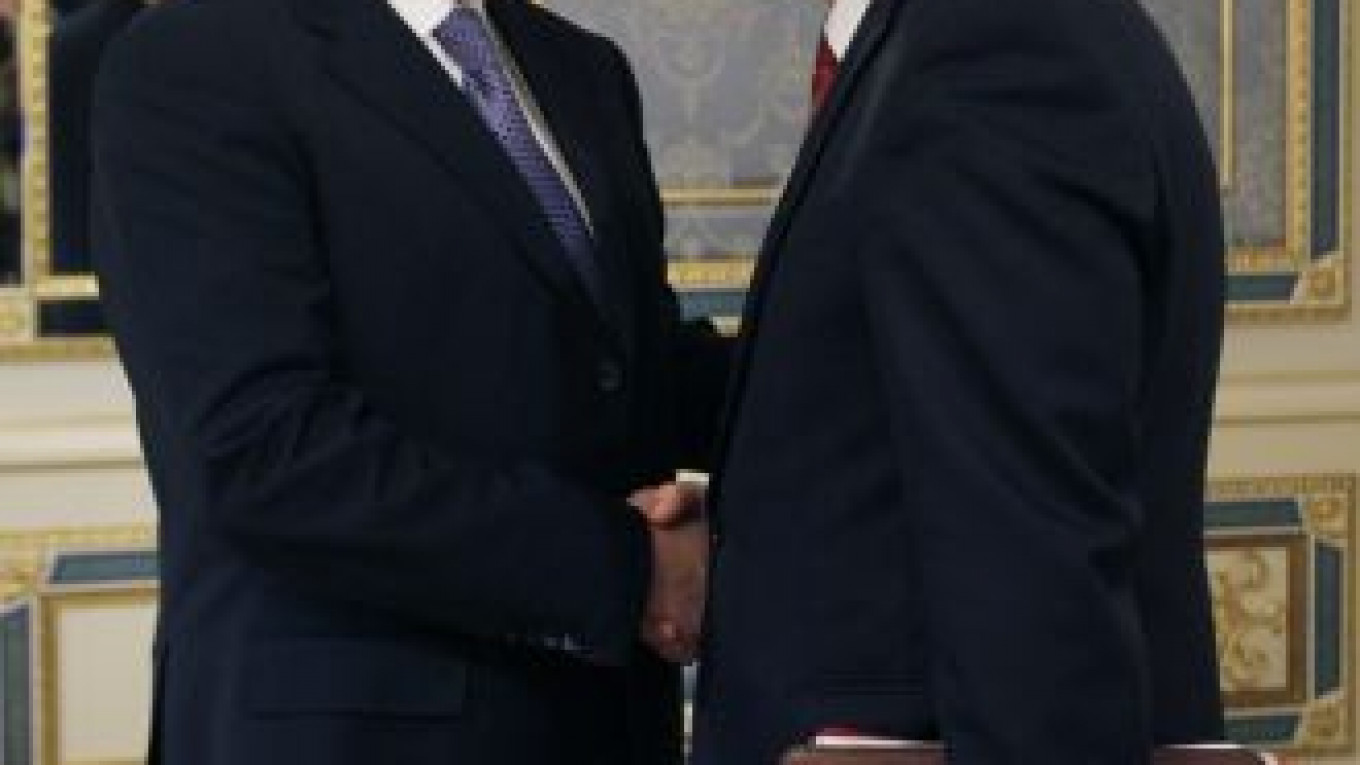KIEV — Jailed opposition leader Yulia Tymoshenko would have to return to Ukraine to complete her prison sentence after receiving any medical treatment abroad, according to the text of a draft law made public Friday.
Parliament is scheduled to debate the draft next week in a new twist in the case of Tymoshenko, whose imprisonment is threatening the signing of a landmark agreement between Ukraine and the European Union next month.
Tymoshenko was jailed for seven years in 2011 for abuse of office, after a trial which Western governments say was politically motivated and smacked of "selective justice."
European envoys, shuttling between Brussels and Kiev, have asked President Viktor Yanukovych to grant a pardon to his arch-rival to allow her to travel as a free person to Germany to be treated for spinal problems.
This formula, if accepted, is widely seen as sufficient to ensure that the EU would sign the deal on association and free trade at a summit in Vilnius, Lithuania, on Nov. 28. For ex-Soviet Ukraine, it would mark a historic shift towards the West and away from Russia.
Yanukovych, in a surprise move, said Thursday he was ready to sign a law to allow her to go abroad for treatment, if a draft was adopted by parliament. But he did not mention granting her a pardon.
In comments carried on his website, he said: "Naturally, if parliament adopts this law, I will sign it."
Tymoshenko, 52, says her trial was a personal vendetta by Yanukovych. She has said she is ready to go to Berlin for treatment, but her family says she wants to benefit from a pardon, as requested by the EU envoys, to be able subsequently to return to political life.
A text of the draft to go before parliament next week said it would be up to a Ukrainian court to decide whether Tymoshenko was ill enough to qualify for treatment abroad, and the court would also define the length of time allotted for treatment.
"On the expiry of the term, defined by the court for treatment abroad, the convicted person would return to Ukraine to continue serving the punishment," it said.
Parliament speaker Volodymyr Rybak said the proposed draft would be discussed next week in a full session of the assembly. "This law must be such that convicted people do not avoid punishment because treatment is not a pardon," he said, according to the parliament's website.
A first reaction from the Tymoshenko camp suggested the new development might not be acceptable to her.
Her lawyer, Serhiy Vlasenko, said the draft law ran counter to the EU's criteria for democratic progress, which the bloc has said it wants Ukraine to meet for the Vilnius summit.
"The criteria require an end to selective justice, not a suspended sentence," Vlasenko said.
Pro-Yanukovych deputies dominate in parliament and the draft law seemed likely to get strong support from them, though the political opposition sees no need for such a law.
The two EU envoys, Irish politician Pat Cox and former Polish President Aleksander Kwasniewski, will discuss the new proposal with both sides when they visit Kiev next week.
"Cox and Kwasniewski will resume their efforts to resolve the Tymoshenko case. They will be in Kiev on Monday and Tuesday for further talks," a European Parliament official dealing with the affair said in Brussels.
Tymoshenko has been receiving treatment for her back problems from German doctors under prison guard in a hospital in the northern city of Kharkiv.
Up to now, her family and supporters have been talking in terms of her going to Berlin's Charite clinic for treatment.
She said Oct. 4 that, while she was ready to go to Germany for the sake of Ukraine, she would not seek political asylum there and would continue to fight "dictatorship" in her country.
European Union trade ministers are warning Russia to stop pressuring neighboring countries that seek closer ties with the EU.
The 28 nations hope to sign or initial closer cooperation agreements with Ukraine, Moldova and Georgia at a special summit next month, but Moscow has urged them to instead align themselves closer to Russia.
Lithuanian Foreign Minister Linas Linkevicius chaired the meeting and said that the "pressure exerted by Russia against Eastern Partnership countries is unacceptable."
Russia has told Ukraine that a price cut in gas would only be possible if Ukraine does not sign up to an EU association agreement at a Nov. 28 to 29 summit. Last month, Russia banned Moldovan wine, arguing that it did not meet quality standards.
The ministers also criticized Moscow for banning Lithuanian dairy products. (AP)
A Message from The Moscow Times:
Dear readers,
We are facing unprecedented challenges. Russia's Prosecutor General's Office has designated The Moscow Times as an "undesirable" organization, criminalizing our work and putting our staff at risk of prosecution. This follows our earlier unjust labeling as a "foreign agent."
These actions are direct attempts to silence independent journalism in Russia. The authorities claim our work "discredits the decisions of the Russian leadership." We see things differently: we strive to provide accurate, unbiased reporting on Russia.
We, the journalists of The Moscow Times, refuse to be silenced. But to continue our work, we need your help.
Your support, no matter how small, makes a world of difference. If you can, please support us monthly starting from just $2. It's quick to set up, and every contribution makes a significant impact.
By supporting The Moscow Times, you're defending open, independent journalism in the face of repression. Thank you for standing with us.
Remind me later.






